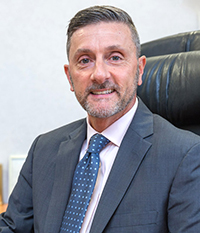Financing Digital Manufacturing
As Siemens’ Digital Factory leader, Raj Batra, noted, one of the biggest trends worth celebrating in manufacturing is how digital solutions can keep powering American manufacturing forward. However, manufacturers sometimes face financial barriers in affording critical upgrades while maintaining productivity. Creative financing from a tech-savvy financier such as Siemens Financial Services (SFS) can make the digital enterprise more accessible, allowing firms to stay competitive in a rapidly evolving market.
Adopting a Digital Mindset with the Help of Financing
As the fundamentals of manufacturing have evolved, so have financing solutions. According to a recent report, “The Digitalization Productivity Bonus: Sector Insights,” more firms are moving towards financing business outcomes rather than financing a single technology investment directly. Manufacturers should also consider all financial options that effectively digitalize their entire operation – from equipment to production lines. Financiers, such as SFS, understand this technology intimately to properly assess future benefits and business outcomes over the long-term. Financing techniques that support this new mindset include:
- Covering the total solution and total cost of ownership – from hardware and software to services – allowing manufacturers to secure digital transformation at guaranteed cost
- Building in technology upgrade options so manufacturers are not stuck with obsolete equipment
- Offering flexible financing periods to suit the pace by which each manufacturer will reduce costs or increase sales because of digitalization
- Providing capital to support strategic mergers or acquisitions or tightened liquidity due to rapid growth
- Supporting a manufacturer’s expansion, using project finance solutions, both domestically and abroad, with resources to meet customer needs all over the world
Modernizing Equipment
According to the Bureau of Economic Analysis, the average age of manufacturing assets in the U.S. is close to 20 years. Unfortunately, moving to new technology can result in a period during which a manufacturer is paying for two pieces of equipment at once. Transition financing offers one solution. This arrangement defers payments until the new product is fully operational.
A great example is the Extended Payment Term (EPT) loan, which allows up to 180 days to complete payment with no effect on credit lines. EPT was critical to a manufacturing customer in completing the MTA East Side Access Project in New York City. SFS approved the manufacturer for this loan, enabling the purchase of equipment from Siemens to complete the project.
Beyond Equipment
Financing helps manufacturers digitalize full operations beyond a piece of equipment. Manufacturing firms become better equipped to leverage digitalization with capital to grow business, whether it’s through a merger or acquisition of manufacturing lines, automation solutions, IT processes, and even entire factories or additional funds needed to support growing demands.
U.S.-based AK Steel took this approach when it sought to acquire a Russian steelmaker’s operations in Dearborn, Michigan to expand and modernize its operations. SFS helped the company accomplish this by committing $100 million in a multi-lender working capital facility in support of the acquisition. The resulting value of the acquisition was a 40 percent improvement in the company’s shipping capabilities and enhanced operational flexibility to increase scale and better serve customers.
As more manufacturers look to these processes to improve their bottom line, finding the right financing solution is crucial to making the transition seamless.
 Gary Amos is head of Americas for the Commercial Finance business unit of Siemens Financial Services (SFS). In this role, he is responsible for the P&L of an organization that includes SFS’s captive healthcare and industrial asset finance businesses, as well as the third-party vendor finance platform for the Americas. A member of the SFS Commercial Finance Global Leadership Team, which is composed of five regions and operates in 14 countries, Amos also evaluates additional country growth opportunities outside the U.S. that fall within the Americas Region.
Gary Amos is head of Americas for the Commercial Finance business unit of Siemens Financial Services (SFS). In this role, he is responsible for the P&L of an organization that includes SFS’s captive healthcare and industrial asset finance businesses, as well as the third-party vendor finance platform for the Americas. A member of the SFS Commercial Finance Global Leadership Team, which is composed of five regions and operates in 14 countries, Amos also evaluates additional country growth opportunities outside the U.S. that fall within the Americas Region.
Amos joined SFS in 2007 as vice president and national sales manager, tasked with setting strategic direction for SFS’ Industrial Leasing platform on a direct basis. A 20-year veteran, Amos was vice president of business development at GE Commercial Finance and national accounts manager at DLL prior to joining SFS.
 Anthony Casciano is the CEO of the global Industry and Healthcare Finance businesses for Siemens Financial Services (SFS). He oversees the growth of Siemens Financial Services’ activities in the global healthcare and industrial markets and manages the global leveraged finance business across all industries.
Anthony Casciano is the CEO of the global Industry and Healthcare Finance businesses for Siemens Financial Services (SFS). He oversees the growth of Siemens Financial Services’ activities in the global healthcare and industrial markets and manages the global leveraged finance business across all industries.
Anthony was also responsible for the strategy and creation of the global healthcare and leveraged finance business unit after SFS underwent an organizational change in 2011 to better align with Siemens’ core sectors. In addition, he expanded the healthcare finance business, which provides debt and equity solutions to the healthcare industry, into the Asia-Pacific region. To that end, he directed Siemens Financial Services’ participation with Lend Lease as the lead consortium for the public private partnership to design, construct, maintain and finance the Sunshine Coast University Hospital, a new tertiary hospital built in Queensland, Australia.
Previously, Anthony was senior vice president and general manager at SFS in North America, establishing SFS’ Corporate Finance Group which specializes in leveraged lending to middle market and larger corporate clients. He led the group’s rapid growth as a key contributor to SFS’s U.S. business success and was involved in several transactions including refinancing of Luminator Technology Group and provision of a loan that enabled Preferred Sands of Genoa to grow its sand mine business in rural Nebraska. SFS’s involvement in transactions such as these helped establish Siemens as a key player in the leveraged finance business.
Prior to joining Siemens in 2008, Anthony was managing director and head of DB Mid-Market Capital at Deutsche Bank, where his team focused on leveraged finance opportunities to mid-sized companies. Previous to that, Anthony was the chief sales officer for the commercial and corporate finance business units at CIT and held various leadership positions within GE Capital’s corporate finance businesses.
To learn more about SFS, visit Siemens Financial Services.








